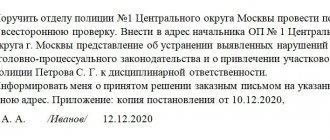When to complain
There can be many situations when the rights of citizens to legal protection are violated. Most often such violations manifest themselves in the following:
- You filed an application to initiate a criminal case, but no one is investigating your application.
- The check was carried out, but superficially, without taking into account important circumstances, after which an unfounded decision was made to refuse to initiate a criminal case.
- The case was opened, but under the wrong article of the Criminal Code of the Russian Federation, without clarifying the real circumstances indicating a more serious crime.
- A case has been opened, but practically no investigation is carried out into it: witnesses are not questioned, material evidence is not confiscated, measures are not taken to detain the criminal, etc. Ultimately, the proceedings may be suspended and it will be almost impossible to achieve justice.
- You do not receive any notifications, copies of decisions made, etc., you are in complete ignorance and all attempts to find out what happened to your application are absolutely unsuccessful.
In the listed examples, not only can you turn to the supervisory authorities for help, but you also need to do this as soon as possible . Otherwise, you may miss valuable investigation time “in hot pursuit.”
However, in some situations you can do without writing a complaint. For example, when during a certain investigative action there are inaccuracies or omissions that can be eliminated “on the spot.” There is a legal procedure for correction for this, and it is quite possible not to resort to the appeal procedure.
Example No. 1 . In the theft case, witness P.A. Vasyukov was questioned, whose testimony was recorded in the protocol by the police investigator. Before signing the protocol, Vasyukov P.A. I carefully read the text compiled by the investigator and found a lot of inaccuracies in it. Vasyukov P.A. refused to sign such a protocol because he considered it unreliable. Vasyukov P.A. drew the investigator's attention to the fact that the time and place were distorted, as well as other circumstances that were significant for the case. Acting in accordance with the law, the investigator invited the witness to supplement the contents of the protocol with his own hand, recording clarification on the date, time and place of events, which was done, and subsequently certified by the signature of P.A. Vasyukov.
Thus, if during the interrogation your testimony was recorded inaccurately, in this case there is no need to write a complaint - it is enough, when signing the document, to indicate what you do not agree with and clarify how it really happened.
The same rules apply to the appointment of examinations.
Example No. 2 . The victim Egorov K.A. burned the car, an appraisal examination was ordered using the available documents in order to find out the value of the car at the time of the crime. When making a decision to order an examination, the victim was absent from the city and was unable to raise his questions for the expert’s permission, while the investigator limited himself to only one thing: “what is the value of the vehicle as of November 1, 2016 (date of the crime).” When reading the expert's report, the victim saw that the estimate was significantly underestimated, since the specialists were not provided with documents on the installation of expensive video equipment in the car. The victim contacted the investigator with an application to order an additional examination, attaching the relevant documentation about additional equipment. This request was granted, and as a result of an additional assessment, the value of the car became higher. Thus, in such situations it is also possible to do without an appeal, following the algorithm of the application procedure in accordance with the Code of Criminal Procedure of the Russian Federation.
And yet, in most situations, complaints cannot be avoided. In order to properly appeal the inaction of the police, let's figure out where to go.
Legislation
The detained citizen is obliged to proceed from the standards laid down by the laws of the Russian Federation. And these allow people’s freedom to be limited for some time only in certain cases. Thus, Article 91 lists the following:
- suspicion of committing a criminal act, which is confirmed by: performing illegal actions in the presence of the police (caught on the spot);
- testimony of witnesses;
- the presence of traces of a criminal act on the body or clothing;
Article 14 of Law No. 3-FZ supplements the list with special situations. Thus, the following persons may be detained on legal grounds:
- evading: execution of punishment;
- investigative activities;
- prisons;
People who violate current legislation may have their freedom restricted for several hours. For example, drinking alcohol in public places.
Limitation on periods of detention
The police operate strictly within the established rules. And they are:
- three hours after the restriction of freedom of movement, the detainee must be presented with a protocol with the reason for such actions;
- It is allowed to detain a citizen without a court verdict for no more than 48 hours;
- If the court decides that the grounds are significant, then the period is extended by:
- 72 hours;
- 120 hours if necessary to collect evidence.
Procedural points
The law obliges law enforcement officers to document their actions. The procedure includes the following points:
- informing the suspect of the position, surname, name and patronymic of the police officer;
- confirmation of rights with a document at the request of the suspect;
- notification of the legal reason for the retention;
- preparation of the protocol;
- familiarization of the person with the document for signature;
- informing the prosecutor's office about the actions taken (after 12 hours of the suspect being in the station);
- organizing a meeting between a citizen and a defense attorney (the meeting lasts no more than 2 hours).
Who can make the police work?
As a general rule, depending on your situation, you can file a complaint against the actions of the police with the following authorities:
To the prosecutor's office
This is a government organization that controls the police in everything. The prosecutor of a district or region may request any material or criminal case to verify the legality of the measures taken on it. If during the inspection (its duration is up to 10 days) violations of the law are revealed, the prosecutor gives instructions to immediately correct them and submits a proposal addressed to the head of the police department (administration) to bring the officials to disciplinary liability. In this case, the applicant must be notified of all stages of the verification process, after which a response about the decision made is sent to him.
To court
We can say that this is the highest authority in the matter of appealing the actions/inactions of police officers. In court, the complaint will be considered within five days, and the officials who made the decision or carried out the action you are appealing will be called to the meeting.
Based on the results of the review, the court may declare any action (inaction) of a police official illegal and order the violations to be eliminated. The court ruling is mandatory for everyone, including the investigator and interrogating officer. Let us note that such appeals are considered by the court in accordance with Art. 125 of the Code of Criminal Procedure of the Russian Federation, which excludes the possibility of appealing against police actions in cases that are already being considered by this or another judge on the merits.
Example No. 3 . Accused Sokolov A.Yu. filed a complaint in accordance with Art. 125 of the Code of Criminal Procedure of the Russian Federation to the court, because he did not agree with the inaction of the investigator, expressed in the failure to conduct a confrontation between two witnesses. According to A.Yu. Sokolov, there are significant contradictions in the testimony of these witnesses, which is a legal basis for holding confrontations. When considering the complaint, the court found that the criminal case against Sokolov A.Yu. was submitted to the same court and scheduled for hearing in the coming days. In this regard, the complaint was rejected, since Art. 125 of the Code of Criminal Procedure of the Russian Federation provides for the procedure for appealing against police inaction only in those cases that have not yet been brought to court.
To the head of the police authority
It is advisable to send complaints of a special nature to this addressee - for example, when during an inspection or investigation an official behaves incorrectly, rudely, communicates using obscene language, etc. Such circumstances will be the subject of an internal review, as a result of which the police officer may be subject to disciplinary action.
The law provides for the possibility of appealing to the head of a department on other issues, including appealing decisions, actions, or inactions of employees subordinate to him. But, as practice shows, it is still more effective to send complaints to the prosecutor’s office or court.
CSS
In some cases, when we are talking about possible criminal liability of a police officer, you need to contact the Internal Security Department (USB). Thus, in case of extortion of money for initiating a criminal case, obvious concealment of evidence, or even assistance to a suspect, you need to contact the security service, where, after an appropriate check, they can decide on the criminal liability of the guilty official.
Features of compilation
Regardless of which authority you decide to write a complaint to, take into account the following:
- The author of the complaint can be any person whose rights have been violated. It can be either the victim in the case or the legal representative of the victim, the accused, his relatives, etc. In addition, the application can be signed by a representative by proxy in the interests of a certain person with whose personality the events are connected, as well as by a lawyer.
- The complaint can be written either by hand or compiled on a computer.
- The law does not contain any requirements for text formatting. At the same time, the application must meet certain criteria of local legislative acts. So, if you are preparing a statement about police inaction to the prosecutor’s office, it will be useful to know about some of the rules enshrined in the Instructions on the consideration of appeals, approved by the Prosecutor General of the Russian Federation. According to this internal document, prosecutors have the right to leave without consideration applications that do not contain a return address, as well as from the content of which it is impossible to understand the meaning of what happened, etc.
Time limits for consideration of a complaint
Administrative regulations governing the relationship between citizens and various authorities prescribe that the consideration of a complaint cannot exceed 30 days from the date of its registration by the relevant department . This period can be increased to 60 days if additional measures are required (search and interview of witnesses, request and study of documents, etc.).










